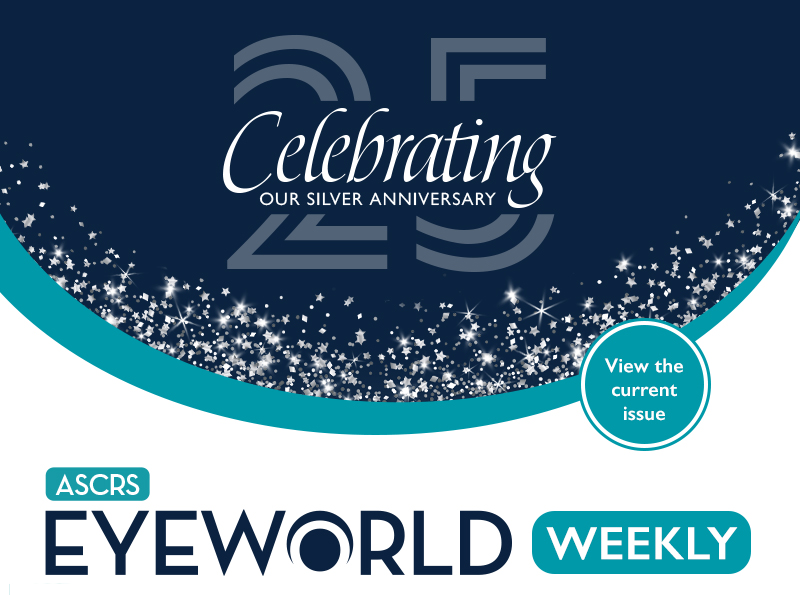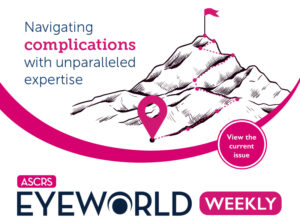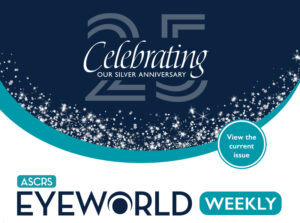
- Phase 3 clinical trials compare brolucizumab to aflibercept for DME
- Study: Randomized clinical trial evaluates combination drops, drop monotherapy, and dropless cataract surgery
- Commercial rights agreement for triamcinolone drug candidate
- ASCRS news and events
August 20, 2021 • Volume 27, Number 33
Phase 3 clinical trials compare brolucizumab to aflibercept for DME
Novartis announced positive results from its two Phase 3 clinical trials that compared Beovu (brolucizumab) 6 mg to aflibercept 2 mg in patients with DME. One trial (KITE) in its second year evaluated Beovu at up to 16-week dosing intervals, while the other study (KINGFISHER) evaluated it dosed every 4 weeks over a 1-year period. According to the company’s press release, the KITE trial reaffirmed visual acuity gains and fluid reduction as recorded in the first year of the trial. The company also reported greater fluid reduction in the central subfield thickness and fewer patients with intraretinal and/or subretinal fluid compared to aflibercept at year 2 of the KITE trial. The KINGFISHER trial showed Beovu non-inferiority to aflibercept in mean change from baseline BCVA at 1 year at the prescribed dosing schedule. According to the company’s press release, Novartis submitted applications to the FDA and EMA for Beovu for treatment of DME.
Study: Randomized clinical trial evaluates combination drops, drop monotherapy, and dropless cataract surgery
A randomized clinical trial published in JAMA Ophthalmology compared the effect of combination prednisolone-ketorolac drops, ketorolac monotherapy, and sub-tenon injection of a dexamethasone depot on central macular thickening after uncomplicated cataract surgery. The study took place at a single center. According to the paper, patients were randomized into 1 of 5 groups: combination drops with or without preop initiation of the steroid plus NSAID, NSAID monotherapy with or without preop initiation of the NSAID, or sub-tenon depot injection. Those in the drops group were instructed to administer drops three times per day for 3 weeks postop. The research did not detect a difference in central subfield thicknesses or visual acuity between any of the groups, but the authors noted that more than half of the patients who received the depot injection received additional anti-inflammatory therapy. The authors also stated that there was not superiority when drops were used preoperatively vs. being initiated the day of surgery. The authors concluded that NSAID monotherapy is preferred in the setting of uncomplicated cataract surgery.
Commercial rights agreement for triamcinolone drug candidate
Harrow Health announced its agreement with Wakamoto Pharmaceutical to acquire commercial rights for its preservative-free triamcinolone acetonide ophthalmic injection drug candidate in the U.S. and Canada. MAQ-100, according to the company’s press release, is currently marketed and sold by Wakamoto in Japan as MaQaid. There it is indicated as an intravitreal injection for visualization for vitrectomy, diabetic macular edema, macular edema associated with RVO, and non-infectious uveitis, the press release stated. Harrow Health plans to begin a clinical program and will submit an NDA in the U.S. for MAQ-100 for visualization during vitrectomy. The press release stated that Wakamoto will receive payments based on achievements of commercial milestones and it will supply Harrow Health with MAQ-100.
ASCRS news and events
- ASCRS Clinical Survey: The ASCRS Clinical Survey will close at the end of August. ASCRS members, please take 15 minutes of your time to complete this survey, which contributes valuable data for educational initiatives and tracks trends over time.
- ASCRS Journal Club: The recording of the ASCRS Journal Club Symposium at the 2021 ASCRS Annual Meeting is now live as an online CME opportunity for ASCRS members. View the session and take the post-test.
- New member benefit: ASCRS and ASOA have a new Remote Patient Monitoring Guide, a member-only benefit.
Research highlights
- A study published in the journal Clinical Ophthalmology described the positive effect that scripted lifestyle counselling had on adherence to glaucoma medical regimens. The authors reported that this prospective cohort study from May–July 2018 found that of 116 patients who met inclusion criteria, 59.5% were adherent to their medication regimen at baseline. Seventy-six patients were reached for follow-up with lifestyle counselling, which the study said included information on diet, exercise, vitamin intake, medication adherence, and more. Of the patients reached for follow-up, there was a 22.4% increase in medication adherence, which the authors reported increased overall adherence in this group from 62.5% to 78.9%.
- Research in the journal Diabetologia reported that mothers who have diabetes before or during pregnancy are more likely to have children who develop ocular issues, such as high refractive error. The population-based cohort study used Danish national medical registers that included data from 1977–2016. A press release about the paper reported that follow-up began at birth and continued until the first diagnosis of high refractive error, death, emigration, reaching 25th birthday, or end of the study period. Of the 2,470,580 live births included in the study, 56,419 were exposed to some form of maternal diabetes. During the follow-up period, high refractive error was diagnosed in 533 children of mothers who had diabetes and 19,695 children of mothers who did not have diabetes. The authors reported that maternal diabetes exposure was associated with a 39% greater risk of developing high refractive error, compared to those of mothers who did not have diabetes. The rate high refractive error in children whose mothers had type 1 or type 2 diabetes was 32%, compared to unexposed individuals, and 68% in children whose mothers who had gestational diabetes, compared to unexposed individuals. Children of mothers who had complications from diabetes were twice as likely to have eye problems, the researchers reported.
Product news
- Metrovision received FDA approval for MonPackONE Vision Monitor for vision electrophysiology applications.
- Cipla received FDA approval for difluprednate ophthalmic emulsion, a generic equivalent to Durezol (Novartis), for treatment of inflammation and pain after ocular surgery and treatment of anterior uveitis.
This issue of EyeWorld Weekly was edited by Stacy Jablonski and Liz Hillman.
EyeWorld Weekly (ISSN 1089-0319), a digital publication of the American Society of Cataract and Refractive Surgery (ASCRS), is published every Friday, distributed by email, and posted live on Friday.
Medical Editors: Eric Donnenfeld, MD, Chief Medical Editor; Rosa Braga-Mele, MD, Cataract Editor; Clara Chan, MD, Cornea Editor; Nathan Radcliffe, MD, Glaucoma Editor; and Vance Thompson, MD, Refractive Editor
For sponsorship opportunities or membership information, contact: ASCRS • 12587 Fair Lakes Circle • Suite 348 • Fairfax, VA 22033 • Phone: 703-591-2220 • Fax: 703-591-0614 • Email: ascrs@ascrs.org
Mention of products or services in EyeWorld Weekly does not constitute an endorsement by ASCRS.
Click here to view our Legal Notice.
Copyright 2021, EyeWorld News Service, a division of ASCRSMedia. All rights reserved.



